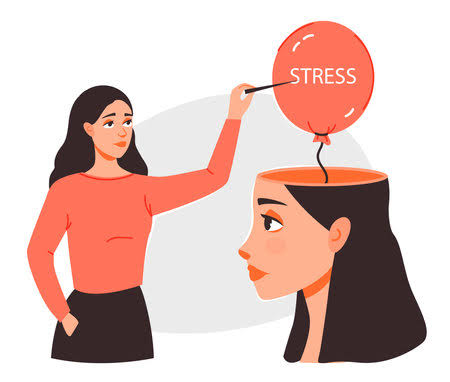Healthy lifestyle for stress management
Content:
* What is the reason behind the stress?
Stress is something we all go through, but the reasons behind it can vary from person to person. Let's look at some common causes of stress in simple terms:
Pressure and Expectations: Feeling pressured to meet high expectations, whether from ourselves or others, can lead to stress. This could be about doing well in school or work, wanting to succeed, or being afraid of failing.
Major life change: Big life events like moving to a new place, starting a new job, getting married, or having a baby can cause stress. These changes disrupt our usual routines and require adjustments, which can be overwhelming.
Work related stress: Having a heavy workload, tight deadlines, a difficult work environment, or conflicts with colleagues can contribute to stress. Job insecurity, feeling like you have no control, or not having the right skills for your job can also be stressful.
Financial problems: Money problems, such as being in debt, losing a job, or struggling to make ends meet, can create a lot of stress. The uncertainty and worry about not having enough money can be very overwhelming.
Issues in relationship: Problems in personal relationships, like arguments with family or friends, or difficulties in romantic relationships, can cause stress. Communication problems, trust issues, or going through a breakup or divorce can all add to the stress.
Health condition: Dealing with health issues, whether physical or mental, can be very stressful. Not knowing what's wrong, experiencing pain, or having to manage a long-term condition can take a toll on your well-being.
Feeling overwhelmed: Feeling overwhelmed by all the things you have to do, trying to handle many tasks at once, or always feeling like you're running out of time can lead to stress. It can be tough to manage everything and find a good balance between work and personal life.
Uncertainty in life: Facing uncertainty about the future or dealing with unexpected changes can be stressful. The fear of not knowing what's going to happen and having to adapt quickly can trigger stress.
Traumatic situation: Going through or witnessing traumatic events, such as accidents, natural disasters, or violence, can cause a lot of stress. It's possible to develop post-traumatic stress disorder (PTSD) as a result.
Remember, stress is a normal response to challenging situations. But if stress continues for a long time or becomes too much, it can negatively affect our physical and mental health. It's important to learn effective ways to manage stress and seek support when needed, so we can live a balanced and healthy life
Tipes for overcome the stress
Stress affects everyone these days and can harm our physical and mental health. But don't worry! In this article, we'll share ten simple strategies to help you manage stress in your everyday life. These tips are easy to follow and can make a big difference in improving your well-being.
Take care yourself:
Make sure to set time for activities that make you feel good, like exercise, meditation, or spending time with loved ones. Taking care of yourself should be a regular part of your routine.
Stay present and calm:
Practice being fully in the present moment without judging it. You can try deep breathing exercises, meditation, or simply taking a mindful walk to reduce stress and clear your mind.
Healthy ways to cope:
Instead of turning to unhealthy habits like excessive drinking or overeating, try healthier alternatives. Talk to someone you trust, seek professional help if needed, or engage in activities like yoga or journaling to relieve stress.
Set Boundaries:
It's important to know your limits and say no when you feel overwhelmed. Establishing healthy boundaries will help prevent taking on too much and decrease your stress levels.
Manage your time:
Having good time management skills can reduce stress. Prioritize tasks, create a schedule, and break bigger tasks into smaller, more manageable steps. This will help you stay organized, be productive, and reduce stress.
Build supportive realatinship:
Surround yourself with people who support and understand you. Strong relationships provide emotional support and encouragement during tough times, which can help manage stress.
Get moving:
Physical activity is a fantastic stress management tool. Regular exercise releases feel-good hormones, boosts your mood, and reduces stress. Find activities you enjoy, such as jogging, dancing, swimming, or yoga, and incorporate them into your routine.
Get Enough Sleep:
Getting enough sleep is effective for managing stress. Stick to a consistent sleep schedule, establish a relaxing bedtime routine, and create a sleep-friendly environment. This will ensure you get the rest you need to stay balanced.
Live a healthy lifestyle:
A healthy lifestyle plays a significant role in stress reduction. Eat a balanced diet, limit caffeine and try relaxation techniques like deep breathing or progressive muscle relaxation.
Seek help when needed:
If stress becomes overwhelming or lasts for a long time, don't hesitate to reach out to a professional. A therapist or counselor can offer guidance and support in developing personalized stress management strategies.
Managing stress is important for your overall well-being. By incorporating these ten simple tips into your daily life, you can effectively reduce stress, improve your mental and physical health, and experience greater balance and fulfillment. Remember to prioritize self-care, seek support when needed, and take proactive steps to manage stress for a happier, healthier life.
Benifits of stress management activities:
Engaging in activities that help us manage stress can bring a lot of positive changes to our lives. Here are some ways we benefit from practicing stress management:
Feeling better physically
Stress can cause physical problems like headaches, tense muscles, tiredness, and digestive issues. When we do stress management activities like relaxation exercises or exercise, these physical symptoms can improve, and our overall physical health gets better.
Improve mental health
Stress can make us feel anxious, depressed, moody, or have trouble focusing. When we do activities to manage stress, like meditation, mindfulness, or getting help from professionals, our mental health can improve. We feel calmer, happier, and can think more clearly.
Handling problem better
When we regularly do stress management activities, we become more resilient. This means we can bounce back from tough situations more easily. We learn better ways to overcome with stress and develop healthier habits that help us handle life's challenges.
Making better choice
Stress can make it hard for us to think clearly or make good decisions. When we manage stress well, our thinking improves. We can make smarter choices in our personal and work lives.
Stronger realatinship
Unmanaged stress can strain our relationships with the people around us. But when we practice stress management, we can communicate better, understand others more, and have healthier relationships. This makes our connections with family, friends, and colleagues stronger and more satisfying.
Getting more done
Too much stress can hurt our productivity and how well we perform. When we do stress management activities, we become better at focusing, concentrating, and managing our tasks. This means we can get more done at work and in our daily lives.
Sleeping better
Stress can mess up our sleep and make it hard to rest. But with stress management techniques, like relaxation exercises or creating a bedtime routine, we can improve the quality of our sleep. This means we wake up feeling more refreshed and have more energy.
Enjoying life more
When we manage stress effectively, our overall quality of life improves. We feel better physically and mentally, have better relationships, and can enjoy life more. We can be present in the moment, cherish our connections, and do things that make us happy.
Remember, managing stress is something we need to keep doing throughout our lives. By making stress management activities a regular part of our routine, we can experience these benefits and have a healthier, happier, and more balanced life.




Comments
Post a Comment